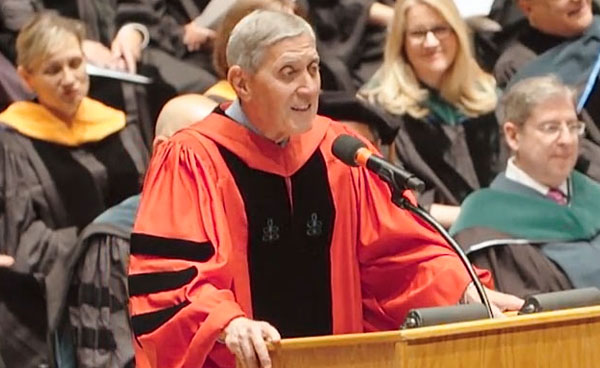Editors’ Note: This spring marks the final term for Dr. Allen Spiegel as Dean at Albert Einstein College of Medicine. One week ago, he delivered the address at Einstein’s 60th Commencement. But we’re not presenting his remarks for those reasons. Instead, we thought his reflections on the efforts needed to treat and cure disease were important and wanted to share them with our readers. What follows is a slightly abridged version of his remarks along with the full video of his address.
 For the past eleven years, I have presided over Commencement as Dean of the Albert Einstein College of Medicine. At this point in the ceremony, I would customarily invite a distinguished speaker to deliver the commencement address, but this afternoon, instead of a formal commencement address, I will offer some personal reflections as I complete my twelfth and final year as Einstein Dean.
For the past eleven years, I have presided over Commencement as Dean of the Albert Einstein College of Medicine. At this point in the ceremony, I would customarily invite a distinguished speaker to deliver the commencement address, but this afternoon, instead of a formal commencement address, I will offer some personal reflections as I complete my twelfth and final year as Einstein Dean.
The title for my remarks: “Of Moonshots, Cancer, Type 1 Diabetes and Other Diseases We’ve Yet To Cure” derives from personal experience. On more than one occasion, as Director of the National Institute of Diabetes and Digestive and Kidney Diseases at the National Institutes of Health, and later as Einstein Dean, I would be sitting at an awards dinner or fundraising gala, and sitting next to me, a parent of a child with type 1 diabetes would pose the following question: “If we can put a man on the moon, why can’t we cure type 1 diabetes?” The first time I heard this question I was stymied, but then responded, almost reflexively: ”putting a man on the moon is just rocket science; that’s a lot easier than curing type 1 diabetes.”
When JFK said in his famous 1961 speech: “I believe we possess all the resources and talents necessary. But the facts of the matter are that we have never made the national decisions or marshaled the national resources required for such leadership. We have never specified long-range goals on an urgent time schedule, or managed our resources and our time so as to insure their fulfillment” he was fundamentally correct. Putting a man on the moon was an engineering problem in which the underlying physics and math were already well understood. The distance from earth to moon was known, 238,900 miles, or thereabouts. The equation for escape velocity to overcome earth’s gravitational force was known, V= the square root of 2GM/r. Less than nine years after JFK’s address to Congress on May 25, 1961, Neil Armstrong and Buzz Aldrin succeeded in landing on the moon and safely returned to earth.
And this is where you, graduates of the Albert Einstein College of Medicine, have a crucial role to play. We need the next generation of brilliant Ph.D. scientists and physician/scientists to make the discoveries that will ultimately lead to prevention and cure of cancer, type 1 diabetes, Alzheimer’s disease, autism and other diseases that still cause so much pain and suffering. And we need the next generation of Einstein-trained physicians to offer the most competent and compassionate care possible to patients whose diseases we have yet to cure.
The arc of the AIDS epidemic epitomizes what I am talking about. At the peak of the epidemic in the 1980’s, Einstein-trained physicians working at Montefiore provided compassionate care and made critical clinical observations in HIV-infected patients dying of AIDS. Then basic research on viral replication and cell entry led to highly effective antiretroviral treatment which converted a death sentence into a chronic disease. Now, progress in immunologic research—with significant contributions by Einstein Montefiore investigators—offers prospects for cure of AIDS, and eventually, cancer, type 1 diabetes, and other autoimmune diseases.
Einstein graduates, you, and (no pressure here) your future accomplishments are the tangible embodiment of all I hoped to achieve in my twelve years as Einstein Dean. I’m optimistic about your future, and thanks to the support of my colleague and friend, Montefiore CEO Steven Safyer, I’m optimistic about Einstein’s future as a leading biomedical research and education institution.

